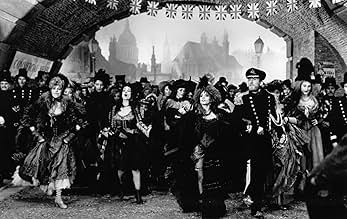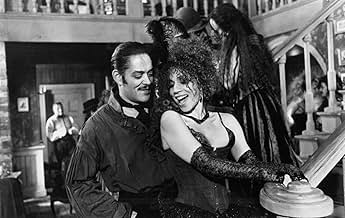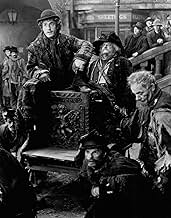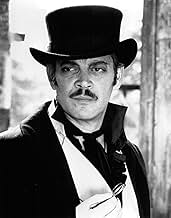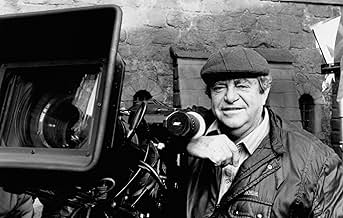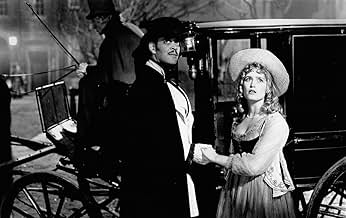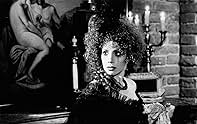In nineteenth century London, a young girl falls for a famous womanizing criminal, and they decide to get married. Her family strongly disapproves, so her father, "the king of thieves", gets... Read allIn nineteenth century London, a young girl falls for a famous womanizing criminal, and they decide to get married. Her family strongly disapproves, so her father, "the king of thieves", gets the gangster arrested.In nineteenth century London, a young girl falls for a famous womanizing criminal, and they decide to get married. Her family strongly disapproves, so her father, "the king of thieves", gets the gangster arrested.
- Director
- Writer
- All cast & crew
- Production, box office & more at IMDbPro
Featured reviews
The fact that most of the budget for this presumably went on the heavy-duty cast list shouldn't have mattered if it had been staged with flair and imagination and some sympathy for the original's satirical intent. Instead we get risibly bad song and dance sequences featuring picturesque beggars and whores, and the final alienation is accomplished by pulling back to reveal the action has taken place on a music-hall stage, appropriately enough for a production that's more Lionel 'Oliver' Blair than Brecht. The acting talent is shamefully misused: Migenes and Walters are good but don't have to try very hard: Migenes at least has a great voice and some feel for the material. Julia looks perfect as Mack, but struggles with the character, straitjacketed by a fake plummy accent. Harris's Peachum is embarrassingly mannered and Polly is atrocious. The adaptations of lyrics, script and music are often awkward: it was a bad move to base the film on Marc Blitzstein's bowdlerised Broadway version, but at least his words were singable, unlike most of what's been interpolated in gestures of faithfulness. And the attempt at overcoming the low budget by filming at claustrophobic angles on mist-shrouded sets lit in garish blues and oranges as if by some bargain-basement Vittorio Storaro fails utterly -- the film just looks cheap, shoddy and thoughtlessly made. Disgraceful.
O.K. Folks, it ain't Brecht, but - the emperor doesn't have any clothes - the original Three Penny Opera is not a work that translates well from the Weimar Republic to our own era. i.e., I'm not so sure authenticity is that important. The sets are overbuilt, there is much too much Lionel Bart feel, but Julia is actually excellent, Mignenes is better yet, and Roger Daltrey's interpolations are kinda fun. Roger Ebert has the negatives right - there is a relentlessly `over-the-top' feel to the whole movie - but the Washington Post reviewer is nonetheless closer. It is quite an enjoyable movie despite the flaws. As to what can go wrong with filming this stage play, take a look at Pabst's 1930 version for a first-class mishmash.
10peacham
Out of the three film versions of this Brecht classic this is by far the best. No, its not perfect. First it uses the watered down Blitztien translation on most songs and there is too much dancing in the film.The main problem with the film is that the editor hacked it up. I have the soundtrack and no less than 6 songs were omitted after filming, including "What Keeps Mankind Alive", the theme of the play! What we are left with though is well done, Raul Julia excels as Mackie, charming, smooth and dangerous and with a great singing voice. Richard Harris is a delight as J.J. Peacham, king of the beggars and is well matched by Julie Walters as his wife. Bill Nighy makes a wonderful;ly confused Tiger Brown and the Jealousy duet performed by Rachel Robertson and Erin Donovan is the musical high point. Not great but a big improvement over the German film and the dull 1960 film with Curt Jergens.
I remember when this version opened at the Chicago Film Festival. There was a reasonable about of excitement about it since there is no contemporary filmed version of Three Penny Opera at all. My conclusion after seeing it is that the big problem is that Three Penny Opera probably can't be successfully filmed at all and still capture the raw stage energy of the stage production. The very idea of the piece is the break the fourth wall between the actors and the audience. I think it's odd nonetheless that this version has never been transferred to DVD. I agree however that the criticisms of it are too harsh. Many a filmed musical from the 1980's and 1990's period has this same look and feel where all the energy of the stage version has been completely drained from the piece.
In fact, Marc Blitzstein's off-Broadway adaptation of "Threepenny" was not so "bowdlerised" as is generally believed.
(I have a special interest in "Threepenny"; my dad was part of the first full production in the US; U of Illlinois Theatre Guild did it around the end of WW2. HJitler had been so nearly successful in suppressing the play that they had to reconstruct the script and score from recordings in two different languages {neither English}, a German prompter's script and similar sources.) Blitzstein's adaptation -- not a "translation" -- which had the full approval of Lotte Lenya -- was a lot closer to the original than generally believed.
The problem is that the version thereof that most people know is the MGM cast recording (recently available on Polygram on CD)(which includes Beatrice Arthur {as Lucy, the "big complete girl", and can't i see her hands on hips and shoulders thrown back on that line -- Bea was a major babe in the 50's}, Paul Dooley and John Astin) was heavily censored by Mike Curb, head of MGM Records -- i mean, 17 (i think it was) "Goddamn"s got cut to just "damn".
(At one time, MGM also offered a 2-LP set of the *entire* play, doubtless as heavily censored.)
(I have a special interest in "Threepenny"; my dad was part of the first full production in the US; U of Illlinois Theatre Guild did it around the end of WW2. HJitler had been so nearly successful in suppressing the play that they had to reconstruct the script and score from recordings in two different languages {neither English}, a German prompter's script and similar sources.) Blitzstein's adaptation -- not a "translation" -- which had the full approval of Lotte Lenya -- was a lot closer to the original than generally believed.
The problem is that the version thereof that most people know is the MGM cast recording (recently available on Polygram on CD)(which includes Beatrice Arthur {as Lucy, the "big complete girl", and can't i see her hands on hips and shoulders thrown back on that line -- Bea was a major babe in the 50's}, Paul Dooley and John Astin) was heavily censored by Mike Curb, head of MGM Records -- i mean, 17 (i think it was) "Goddamn"s got cut to just "damn".
(At one time, MGM also offered a 2-LP set of the *entire* play, doubtless as heavily censored.)
Did you know
- TriviaDame Julie Walters admittedly did this movie to pay off her mortgage.
- ConnectionsFeatured in Musical Hell: Mack the Knife (2021)
- SoundtracksThe Ballad of Mack the Knife
Written by Bertolt Brecht and Kurt Weill with English lyrics by Marc Blitzstein
Performed by Roger Daltrey & Julia Migenes
- How long is Mack the Knife?Powered by Alexa
Details
Box office
- Budget
- $9,000,000 (estimated)
- Runtime
- 2h(120 min)
- Color
- Sound mix
Contribute to this page
Suggest an edit or add missing content

